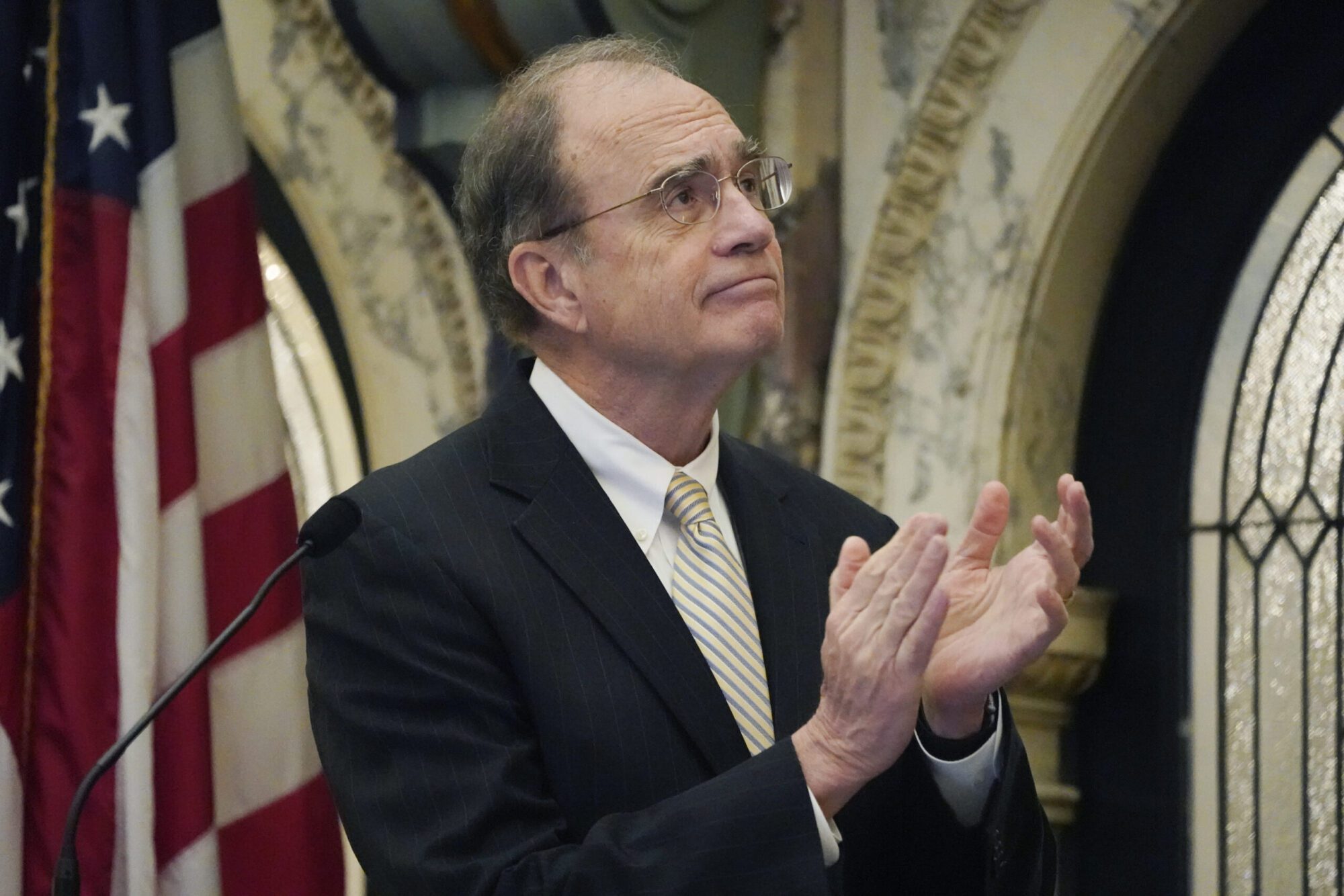
Dr. Robert Welch with the National Center for Cannabis Research presents findings from the testing of products labeled has having low levels of THC or CBD during a recent Senate Public Health Committee hearing. Photo by Jeremy Pittari | Magnolia Tribune
- Products tested show varying rates of CBD and THC that do not match labeling.
The Mississippi Senate Public Health and Welfare Committee intends to amend the House’s legislation that would require testing of hemp products intended for human consumption to ensure such products meet THC limits by inserting language from a dead Senate bill.
On Wednesday, Committee Chairman Senator Hob Bryan (D) indicated that the intent is to reintroduce SB 2706 through a strike-all amendment to HB 1502, essentially reviving the Senate bill after it did not meet the committee deadline and killing the House bill. That House bill passed by a vote of 82-27 last week.
READ MORE: Legislation to test hemp products passes Mississippi House
While both bills have similar goals, the Senate’s version includes broader restrictions. However, State Rep. Lee Yancey (R), author of HB 1502, said both measures seek to ensure that the finished hemp product is capped at a 0.3 percent THC level, closing an existing loophole producers are utilizing to create intoxicating products.
Current law states hemp can only have a THC level of 0.3 percent at harvest, allowing those products to be adulterated later in the process before reaching store shelves. The proposed bills seek to end that practice by ensuring the finished products’ THC levels are no higher than 0.3 percent through mandated testing.
During the Senate committee meeting on Wednesday, members heard from health officials as well as representatives from retail stores.
Hemp products have become popular with consumers across the nation after the passing of the Farm Bill in 2018. Testing has shown products labeled as having low percentages of THC contain much higher levels than advertised. This is due to improper labeling or through the introduction of synthetic cannabinoids added after harvesting.
“We’re not the only state that has this problem, by the way, it’s nationwide, really,” Dr. Robert Welch with the National Center for Cannabis Research said.
THC is not the only cause for concern. Levels of CBD are also being falsely advertised.
Welch said that in 2020, DEA agents seized about 25 hemp-based products and conducted testing. In that operation, of the 25 products seized from convenience stores and vape shops, 22 had measurable amounts of CBD.
“Which means three of them had no CBD in them,” Welch described, saying the levels of CBD in those products ranged from 0.02 to 786 milligrams.
“That’s just to point out the variability of what these people are getting,” Welch added.
A study of the products seized in 2020 reviewed the levels of intoxicating THC and whether synthetic compounds could be found within those products. Dr. Welch told senators that testing found at least one product had 45 percent THC, even though it was advertised as only having CBD.
Of the synthetic compounds that can be found in the products, Delta 8 appears to be most common, derived from the manipulation of acids. Products with Delta 8 have been shown to cause a variety of side effects in consumers, including anxiety, elevated heart rate, vomiting, dizziness, loss of consciousness, tremors, severe paranoia and hallucinations.
Another concern is the impurities added to the products that further exacerbate the negative effects.
“We found a number of compounds that were highly intoxicating cannabinoids… but there are several question marks, which means we couldn’t identify what the compounds were,” Welch described.
Despite the fact that hemp harvested to create these products are only allowed to contain no more than 0.3 percent THC, State Health Officer Dr. Daniel Edney said the adulteration of the hemp after harvest is where the problem lies. Since industrial hemp is not intended for human consumption like medical cannabis, hemp can contain pesticides and heavy metals that are not allowed as part of the medical cannabis program.
“That is a significant public health concern from my vantage point,” Edney said.
Due to the varying levels of THC found in the products, Dr. Edney said it is unclear how many people have failed a drug test because they were unaware they were using a product with high levels of the substance.
Intoxicating hemp beverages have also raised concerns. Ricky Brown, President of the Mississippi Beer Distribution Association, said his group has been approached about the beverages that contain intoxicating amounts of THC. While those drinks are to only contain 5 percent THC for a 12-ounce container, there have reportedly been products on the shelves in Mississippi that contain 30 to 50 milligrams of THC in a 12-ounce can. As Brown pointed out, the loophole there is in the fine print, where it states the container has 12 servings.
“So, they want you to drink an ounce at a time,” Brown said.
Business owners did express concern over the perceived negative effects the proposed new restrictions could have.
William “Bill” Wikstrom owns 10 age-restricted vape businesses across south Mississippi. He asked the Senate committee to draft a bill that would not ban products that are currently legal. He proposed a three-strike rule to have permits pulled for repeat offenders who knowingly sell illegal products or sell to underage customers.
When Senators Kevin Blackwell (R), Brice Wiggins (R) and Juan Barnett (D) asked what products Wikstrom was concerned about, he did not specify. Wikstrom instead said it could affect all products, including gummies, THC drinks, and vape products.
HB 1502 was double referred when it was transmitted to the Senate for consideration. Whether the Senate Public Health and Welfare inserts their language into the bill or not, the legislation, if approved, would then be sent the Senate Finance Committee both reaching the Senate floor.











